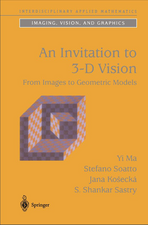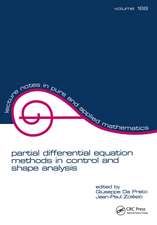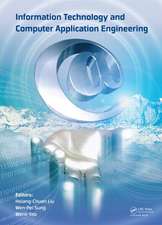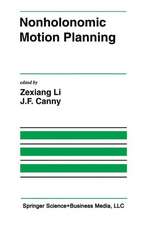A Mathematical Introduction to Robotic Manipulation
Autor Richard M. Murray, Zexiang Li, S. Shankar Sastryen Limba Engleză Paperback – 22 mar 1994
The foundation of the book is a derivation of robot kinematics using the product of the exponentials formula. The authors explore the kinematics of open-chain manipulators and multifingered robot hands, present an analysis of the dynamics and control of robot systems, discuss the specification and control of internal forces and internal motions, and address the implications of the nonholonomic nature of rolling contact are addressed, as well.
The wealth of information, numerous examples, and exercises make A Mathematical Introduction to Robotic Manipulation valuable as both a reference for robotics researchers and a text for students in advanced robotics courses.
| Toate formatele și edițiile | Preț | Express |
|---|---|---|
| Paperback (1) | 1010.70 lei 6-8 săpt. | |
| CRC Press – 22 mar 1994 | 1010.70 lei 6-8 săpt. | |
| Hardback (1) | 1059.23 lei 6-8 săpt. | |
| CRC Press – 27 iul 2017 | 1059.23 lei 6-8 săpt. |
Preț: 1010.70 lei
Preț vechi: 1232.56 lei
-18% Nou
193.42€ • 210.03$ • 162.47£
Carte tipărită la comandă
Livrare economică 22 aprilie-06 mai
Specificații
ISBN-10: 0849379814
Pagini: 476
Ilustrații: 30 halftones
Dimensiuni: 156 x 234 x 28 mm
Greutate: 0.75 kg
Ediția:1
Editura: CRC Press
Colecția CRC Press
Public țintă
UndergraduateNotă biografică
Cuprins
INTRODUCTION:
Brief History.
Multifingered Hands and Dextrous Manipulation.
Outline of the Book.
Bibliography.
RIGID BODY MOTION:
Rigid Body Transformations.
Rotational Motion in R3.
Rigid Motion in R3.
Velocity of a Rigid Body.
Wrenches and Reciprocal Screws.
MANIPULATOR KINEMATICS:
Introduction.
Forward Kinematics.
Inverse Kinematics.
The Manipulator Jacobian.
Redundant and Parallel Manipulators.
ROBOT DYNAMICS AND CONTROL:
Introduction.
Lagrange's Equations.
Dynamics of Open-Chain Manipulators.
Lyapunov Stability Theory.
Position Control and Trajectory Tracking.
Control of Constrained Manipulators.
MULTIFINGERED HAND KINEMATICS:
Introduction to Grasping.
Grasp Statics.
Force-Closure.
Grasp Planning.
Grasp Constraints.
Rolling Contact Kinematics.
HAND DYNAMICS AND CONTROL:
Lagrange's Equations with Constraints.
Robot Hand Dynamics.
Redundant and Nonmanipulable Robot Systems.
Kinematics and Statics of Tendon Actuation.
Control of Robot Hands.
NONHOLONOMIC BEHAVIOR IN ROBOTIC SYSTEMS:
Introduction.
Controllability and Frobenius' Theorem.
Examples of Nonholonomic Systems.
Structure of Nonholonomic Systems.
NONHOLONOMIC MOTION PLANNING:
Introduction.
Steering Model Control Systems Using Sinusoids.
General Methods for Steering.
Dynamic Finger Repositioning.
FUTURE PROSPECTS:
Robots in Hazardous Environments.
Medical Applications for Multifingered Hands.
Robots on a Small Scale: Microrobotics.
APPENDICES:
Lie Groups and Robot Kinematics.
A Mathematica Package for Screw Calculus.
Bibliography.
Index
Each chapter also includes a Summary, Bibliography, and Exercises
Descriere
A Mathematical Introduction to Robotic Manipulation presents a mathematical formulation of the kinematics, dynamics, and control of robot manipulators. It uses an elegant set of mathematical tools that emphasizes the geometry of robot motion and allows a large class of robotic manipulation problems to be analyzed within a unified framework.
The foundation of the book is a derivation of robot kinematics using the product of the exponentials formula. The authors explore the kinematics of open-chain manipulators and multifingered robot hands, present an analysis of the dynamics and control of robot systems, discuss the specification and control of internal forces and internal motions, and address the implications of the nonholonomic nature of rolling contact are addressed, as well.
The wealth of information, numerous examples, and exercises make A Mathematical Introduction to Robotic Manipulation valuable as both a reference for robotics researchers and a text for students in advanced robotics courses.


















